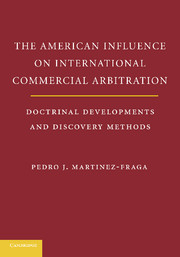Description
The American Influences on International Commercial Arbitration
Doctrinal Developments and Discovery Methods
Author: Martinez-Fraga Pedro J.
The text, follows very closely the doctrinal development in the American jurisprudence of international commercial arbitration.
Language: English
Subject for The American Influences on International Commercial...:
The American Influences on International Commercial Arbitration
Publication date: 01-2014
Support: Print on demand
Replaced by new edition: Access to the new edition.
Publication date: 01-2014
Support: Print on demand
Replaced by new edition: Access to the new edition.
The american influences on international commercial arbitration: doctrinal developments and discovery methods
Publication date: 03-2009
432 p. · 18.3x26 cm
Replaced by new edition: Access to the new edition.
Publication date: 03-2009
432 p. · 18.3x26 cm
Replaced by new edition: Access to the new edition.
Description
/li>Contents
/li>Biography
/li>
This text traces the contours of US doctrinal developments concerning international commercial arbitration. It explores international commercial arbitration as a bridge that creates symmetry between what the author perceives as an anomaly arising from the disparities between the monolithic framework arising from economic globalization and a fragmented global judicial counterpart. Specifically, American common law discovery precepts are analyzed through the prism of the fundamental precepts of party-autonomy, predictability, uniformity, and transparency of spender, which the author contends to be the rudimentary tenets of both the American common law procedural rubric and the very principles that international commercial arbitration seeks not only to preserve but to enhance. Therefore, as the author asserts, the discovery process endemic to American common law comports more closely with international commercial arbitration both procedurally and theoretically than with those of the 'taking of evidence' methodology commonly used in international commercial arbitrations held under the auspices of arbitral institutional bodies.
1. Introduction; 2. The formation and transformation of the status of international and domestic arbitration in the United States; 3. Shifting paradigm: Wilko v. Swan, Scherk v. Alberto-Culver, and Mitsubishi v. Soler: crafting a level playing field; 4. The taking of evidence v. common law discovery; 5. The gathering of evidence v. common law discovery; 6. What has really happened? The effects of a trilogy examined; 7. The new unorthodox conception of common law discovery in international arbitration; 8. And now how do we avoid 28 U.S.C. Section 1782 in international commercial arbitration?; 9. Perjury and arbitration: the honor system where the arbitrators have the honor and the parties have the system; 10. Developments in the apportionment of jurisdiction between arbitrators and courts concerning the validity of a contract containing an arbitration clause, and transformations regarding the Severability Doctrine; 11. U.S. arbitration law and its dialogue with the New York Convention: the development of four issues; Appendix A. Duelos a Garrotazos; Appendix B. Selected cases; Appendix C. The New York convention, the Federal Arbitration Act, and 28 U.S.C. § 1782; Appendix D. Amendments to 28 U.S.C. § 1782; Appendix E. Selected rules of civil procedure; Appendix F. Geneva Convention of 1927; Appendix G. Selections from the legislative history of the Federal Arbitration Act.
Pedro J. Martinez-Fraga is currently an adjunct professor of law at the University of Miami School of Law, where he teaches transnational litigation and arbitration. Mr Martinez-Fraga is a full Visiting Professor at the University of Navarra in Pamplona, Spain, and President of the Global Dispute Resolution Center of the Maiestas Foundation, with venues in Pamplona, Spain, and Beijing, China. Mr Martinez-Fraga has lectured in a dozen non-US law schools on private international law. He has authored more than twenty peer-reviewed articles and three books on private international law. He has also served as co-editor of and contributing author to a fourth text in this field. Mr Martinez-Fraga is on the list of counsel for victims and defendants of the International Criminal Court at the Hague. He received his J.D. from Columbia University (Harlen Fiske Stone Scholar) and a B.A. from St. John's College, Annapolis (Highest Honors). He was recognized by Florida Super Lawyers as one of the top 100 lawyers in 2006, 2007, and 2008 and was featured as the cover story in the 2006 inaugural issue of Florida Super Lawyers magazine. In addition, he was the recipient of the 2005 Most Effective Lawyer Award for International Law from the Daily Business Review and was a finalist for the same award in 2006.
© 2024 LAVOISIER S.A.S.




